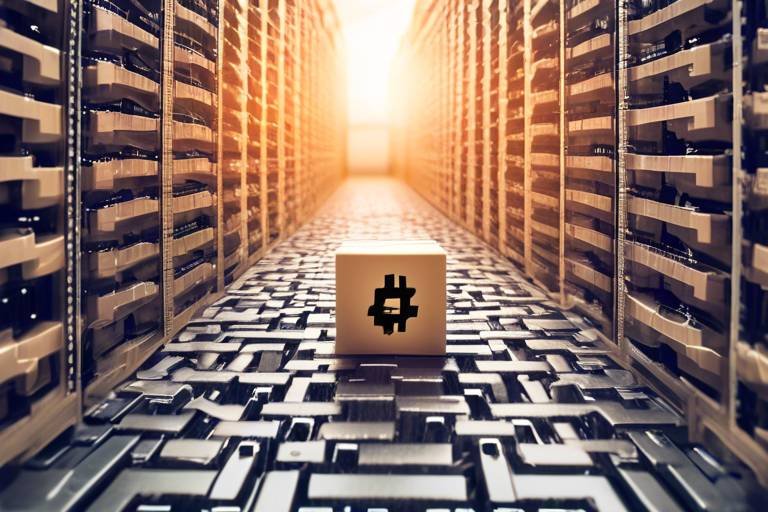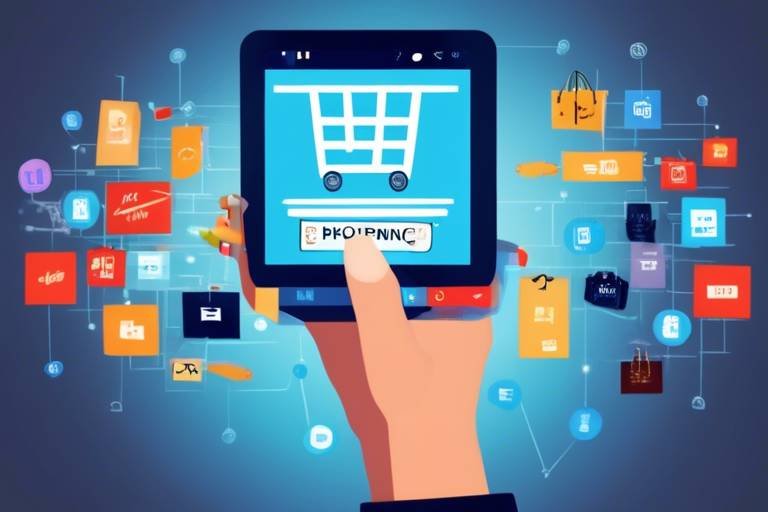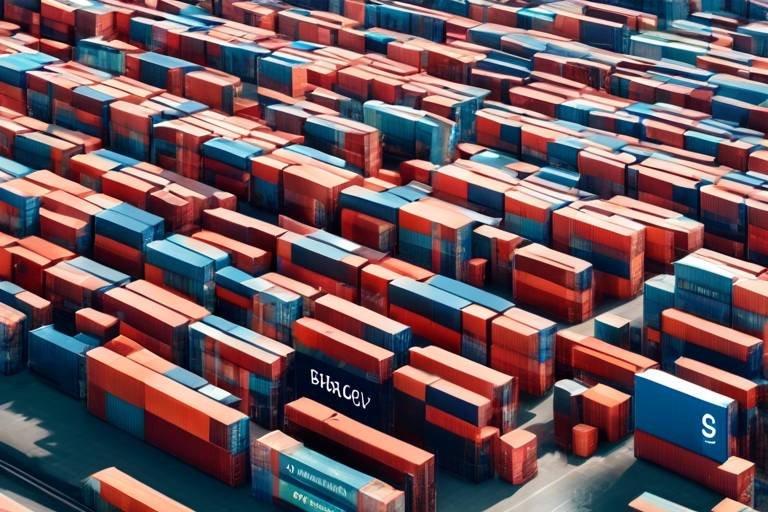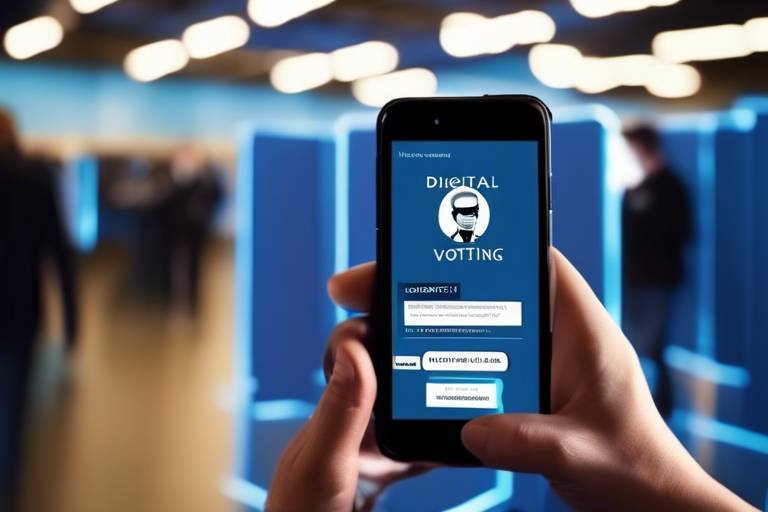The Role of Blockchain in Enhancing Supply Chain Resilience
In today's fast-paced global economy, supply chains are the backbone of commerce, connecting producers, distributors, and consumers. However, these intricate networks often face significant challenges, from unexpected disruptions to inefficiencies that can lead to financial losses. Enter blockchain technology, a game-changer that promises to revolutionize the way supply chains operate. By leveraging the decentralized nature of blockchain, companies can enhance transparency, improve security, and ultimately, build resilience against disruptions. Imagine a world where every transaction is recorded in a tamper-proof digital ledger, accessible to all stakeholders, creating a seamless flow of information. That's the power of blockchain!
Blockchain operates as a decentralized digital ledger that records transactions across multiple computers, ensuring that no single entity has control over the entire network. This characteristic is particularly beneficial for supply chains, where trust and transparency are paramount. With blockchain, every participant—from manufacturers to retailers—can access the same real-time data, fostering collaboration and trust. This article will explore how blockchain can strengthen supply chains, improve transparency, and increase resilience against disruptions, ultimately leading to a more efficient and secure operational environment.
At its core, blockchain technology is a series of interconnected blocks that contain data about transactions. Each block is linked to the previous one, creating a chain that is virtually impossible to alter without consensus from the network. This decentralized approach eliminates the need for intermediaries, reducing costs and increasing efficiency. In supply chain management, this means that every step of the product journey—from raw materials to the end consumer—can be recorded and verified in real-time. This level of visibility not only enhances operational efficiency but also builds trust among all parties involved.
Implementing blockchain technology in supply chains can lead to a multitude of benefits that enhance overall performance. Here are some key advantages:
- Increased Efficiency: By automating processes and reducing the need for manual record-keeping, blockchain can streamline operations.
- Reduced Costs: The elimination of intermediaries and reduced fraud can lead to significant cost savings.
- Enhanced Security: Blockchain’s cryptographic techniques ensure that data is secure and tamper-proof.
One of the most significant advantages of blockchain technology is its ability to provide a transparent view of transactions. In a traditional supply chain, information is often siloed, leading to discrepancies and mistrust among stakeholders. With blockchain, all parties can access the same information, fostering trust and collaboration. For example, if a retailer wants to verify the origin of a product, they can easily trace its journey through the supply chain, ensuring authenticity and compliance with safety standards.
Traceability is a crucial aspect of supply chain management, especially in industries like food and pharmaceuticals. With blockchain, each product's journey can be tracked in real-time, allowing companies to quickly identify and address any issues that arise. This capability is invaluable in preventing fraud and ensuring quality. For instance, if a batch of contaminated food is detected, blockchain enables swift identification of affected products, minimizing health risks and financial losses.
Access to real-time data is a game-changer in decision-making processes. Blockchain facilitates immediate information sharing among supply chain participants, enabling faster responses to market changes and disruptions. Imagine a supplier who can instantly update inventory levels across the network, allowing retailers to adjust their orders accordingly. This kind of agility is essential in today’s dynamic market, where consumer preferences can shift overnight.
Blockchain's cryptographic techniques ensure data integrity and security, protecting supply chain information from unauthorized access. Each transaction is encrypted and linked to the previous one, making it nearly impossible for bad actors to manipulate the data. This level of security is particularly important in industries that deal with sensitive information, such as pharmaceuticals, where counterfeit products pose a significant threat to public health.
While the benefits of blockchain are compelling, organizations face several challenges when implementing this technology in their supply chains. Some of the most common obstacles include:
- Scalability Issues: As supply chains grow, blockchain networks may struggle to handle increased transactions.
- Integration with Existing Systems: Integrating blockchain with legacy systems can be complex and require significant resources.
As supply chains expand, the volume of transactions can increase dramatically. This growth can lead to scalability challenges for blockchain networks, which may struggle to process large amounts of data quickly. Solutions such as layer 2 scaling and sharding are being explored to address these issues, ensuring that blockchain remains a viable option for large-scale supply chains.
Integrating blockchain with legacy systems can be a daunting task. Organizations often have established processes and technologies in place, making it difficult to adopt new solutions. However, with careful planning and a phased approach, companies can overcome these hurdles and ensure a smooth transition to blockchain technology.
Real-world examples illustrate the successful application of blockchain in various industries, showcasing its impact on supply chain resilience. Here are two notable case studies:
Blockchain has transformed the food industry by enhancing traceability and safety. Companies like Walmart have implemented blockchain to track the journey of food products from farm to table. This innovation has led to quicker response times in the event of foodborne illnesses, ensuring consumer safety and confidence.
The pharmaceutical industry has also embraced blockchain to combat counterfeit drugs. By utilizing blockchain, companies can verify the authenticity of medications at every stage of the supply chain, improving security and compliance in drug distribution. This not only protects consumers but also enhances the reputation of pharmaceutical companies.
What is blockchain technology?
Blockchain is a decentralized digital ledger that records transactions across multiple computers, ensuring data integrity and security.
How does blockchain improve supply chain transparency?
Blockchain provides a transparent view of transactions, allowing all parties to access the same information, which fosters trust and collaboration.
What are the challenges of implementing blockchain in supply chains?
Challenges include scalability issues and the complexity of integrating blockchain with existing systems.
Can blockchain help prevent fraud in supply chains?
Yes, blockchain enhances traceability and security, making it more difficult for fraud to occur.

Understanding Blockchain Technology
Blockchain technology, often hailed as a revolutionary advancement, is fundamentally a decentralized digital ledger that records transactions across numerous computers. Imagine a book that everyone can read but no one can erase or alter. This book is shared across a network of computers, ensuring that every participant has access to the same information at the same time. This transparency is one of the core principles that make blockchain particularly valuable in supply chain management.
At its core, blockchain consists of several key components:
- Blocks: Each block contains a collection of transactions. When a block is filled, it is linked to the previous block, forming a chain.
- Decentralization: Unlike traditional databases that are controlled by a single entity, blockchain is distributed across a network, making it more resilient to failures and attacks.
- Consensus Mechanisms: These are protocols that ensure all participants in the network agree on the validity of transactions before they are added to the blockchain. Common mechanisms include Proof of Work and Proof of Stake.
- Cryptographic Security: Each transaction is secured using cryptographic techniques, which ensures that data is immutable and protected from unauthorized access.
This unique structure not only enhances security but also fosters trust among stakeholders. In supply chains, where multiple parties—from suppliers to retailers—interact, having a common, unchangeable record of transactions can significantly reduce disputes and misunderstandings. For instance, if a shipment is delayed, all parties can trace back through the blockchain to identify the exact point of failure, rather than relying on fragmented information.
Moreover, the application of blockchain in supply chain management extends beyond mere record-keeping. It enables smart contracts, which are self-executing contracts with the terms of the agreement directly written into code. This means that once conditions are met, actions are automatically executed without the need for intermediaries. Picture a vending machine: you insert money, select a product, and the machine automatically delivers it. Smart contracts work in a similar manner, streamlining processes and reducing the potential for human error.
In summary, understanding blockchain technology is crucial for organizations aiming to enhance their supply chain resilience. It not only provides a transparent and secure method of recording transactions but also introduces innovative concepts like smart contracts that can streamline operations. As businesses continue to explore the potential of blockchain, they are likely to discover even more ways it can transform their supply chain dynamics.

Benefits of Blockchain in Supply Chains
Implementing blockchain technology in supply chains is not just a trend; it's a transformative shift that brings a myriad of benefits. Imagine a world where every transaction is recorded with unmatched accuracy and every participant has access to the same information in real-time. This is the promise of blockchain, and it can lead to increased efficiency, reduced costs, and enhanced security across supply chain operations. By utilizing a decentralized ledger, businesses can streamline their processes, minimize errors, and ultimately deliver better products to their customers.
One of the most significant advantages of blockchain is its ability to improve transparency. In traditional supply chains, information is often siloed, leading to confusion and mistrust among stakeholders. However, with blockchain, all parties involved can view the same data, fostering an environment of trust and collaboration. This transparency not only helps in maintaining relationships but also ensures compliance with regulations and standards, which is crucial in industries like food and pharmaceuticals.
Furthermore, blockchain enhances traceability of products throughout their journey. Each step a product takes—from raw material sourcing to the final delivery—can be documented on the blockchain. This capability is essential for preventing fraud and ensuring quality. For instance, in the food industry, if a batch of produce is found to be contaminated, companies can quickly trace it back to its origin, minimizing health risks and financial losses. The ability to track products in real-time also allows businesses to respond swiftly to issues, which is a game-changer in today’s fast-paced market.
Another major benefit is the facilitation of real-time data sharing. In a conventional supply chain, delays in information flow can lead to poor decision-making and inefficiencies. Blockchain eliminates this lag by providing immediate access to data for all participants. This means that if a shipment is delayed, everyone involved can see the updated status and adjust their plans accordingly. The result? A more agile and responsive supply chain that can adapt to changes and challenges as they arise.
Moreover, the security features inherent in blockchain technology cannot be overlooked. With its cryptographic techniques, blockchain ensures that data remains intact and secure from unauthorized access. This is particularly important in supply chains where sensitive information, such as pricing and customer data, is often exchanged. By safeguarding this information, businesses can protect their intellectual property and maintain a competitive edge.
In summary, the benefits of blockchain in supply chains are profound. From improved transparency and traceability to enhanced real-time data sharing and security, this technology is set to revolutionize how businesses operate. As organizations continue to explore blockchain solutions, they will likely discover even more advantages that can lead to a more resilient and efficient supply chain.
- What is blockchain technology? Blockchain is a decentralized digital ledger that records transactions across multiple computers, ensuring transparency and security.
- How does blockchain improve supply chain transparency? It provides all parties with access to the same information, reducing confusion and fostering trust.
- Can blockchain help trace products? Yes, blockchain allows for real-time tracking of products, which is essential for quality control and fraud prevention.
- What are the security benefits of blockchain? Blockchain uses cryptographic techniques to protect data integrity and prevent unauthorized access.
- What challenges are associated with implementing blockchain? Common challenges include scalability issues and the integration of blockchain with existing systems.

Improved Transparency
In today's fast-paced world, where information is king, transparency in supply chains is not just a luxury; it's a necessity. Imagine a world where every stakeholder—from manufacturers to consumers—has access to the same real-time data about products. This is where blockchain technology shines, illuminating the dark corners of supply chain operations. By creating a decentralized ledger that records every transaction, blockchain ensures that all parties involved can view the same information, fostering a culture of trust and accountability.
When we talk about transparency, we are essentially referring to the ability to trace and verify the flow of goods from origin to destination. With blockchain, every step of a product's journey is documented and immutable. This means that once a transaction is recorded, it cannot be altered or deleted, which significantly reduces the risk of fraud. For instance, if a consumer wants to know where their organic tomatoes came from, they can scan a QR code on the packaging and instantly access the entire history of that product. This level of detail not only enhances consumer confidence but also holds producers accountable for their practices.
Moreover, the transparency offered by blockchain can lead to improved relationships among supply chain partners. When everyone has access to the same data, misunderstandings and disputes can be minimized. This collaborative environment encourages stakeholders to work together more effectively, leading to better decision-making and enhanced operational efficiency. In fact, studies have shown that companies that prioritize transparency are more likely to build long-lasting partnerships and achieve greater customer satisfaction.
To illustrate the benefits of transparency in supply chains, consider the following key points:
- Trust Building: Transparency fosters trust among all stakeholders, from suppliers to consumers.
- Fraud Prevention: Immutable records reduce the risk of fraudulent activities.
- Enhanced Consumer Confidence: Customers feel more secure knowing they can trace the origin of products.
- Operational Efficiency: Improved information sharing leads to better decision-making and collaboration.
In conclusion, improved transparency through blockchain technology is a game-changer in supply chain management. It not only enhances trust and accountability but also empowers consumers by providing them with the information they need to make informed choices. As we move towards a more interconnected global economy, the importance of transparency in supply chains cannot be overstated.

Traceability of Products
In today's fast-paced market, traceability of products is not just a luxury; it's a necessity. Imagine being able to track a product's journey from its origin to the final consumer with just a few clicks. This is where blockchain technology shines, providing an unprecedented level of transparency that traditional systems simply cannot match. Each product is assigned a unique identifier that is recorded on the blockchain, allowing stakeholders to follow its path through the entire supply chain.
Why is this important? Well, consider the implications of food safety. If a contamination issue arises, being able to trace a product back to its source can save lives and prevent widespread panic. With blockchain, companies can quickly pinpoint the exact batch of contaminated goods and remove them from shelves, minimizing health risks. This level of responsiveness is crucial in maintaining consumer trust and brand integrity.
Moreover, traceability extends beyond just food products. In the pharmaceutical industry, for instance, the ability to track drugs from manufacturing to distribution is vital in combatting counterfeit products. Each transaction is recorded on the blockchain, creating a permanent, tamper-proof history of the product. This ensures that patients receive authentic medications, ultimately saving lives and reducing healthcare costs.
Here's a quick overview of the benefits of product traceability through blockchain:
- Enhanced Consumer Trust: Customers can verify the authenticity and safety of products, which builds loyalty.
- Efficient Recall Processes: In case of defects or contamination, products can be quickly identified and recalled.
- Reduced Fraud: With a transparent history, it becomes nearly impossible for counterfeit products to infiltrate the supply chain.
In essence, the traceability of products facilitated by blockchain not only enhances operational efficiency but also significantly improves safety and compliance across various industries. It empowers consumers and businesses alike, making the supply chain more resilient against disruptions. As we move forward, embracing this technology will be key to thriving in an increasingly complex global market.

Real-time Data Sharing
Imagine a world where every participant in a supply chain has instant access to the same information, where data flows seamlessly and decisions are made on the fly. This is the power of enabled by blockchain technology. By allowing all stakeholders—from suppliers to retailers—to access and update data in real-time, blockchain creates a dynamic environment that fosters agility and responsiveness.
In traditional supply chains, information silos often lead to delays and miscommunication. For instance, if a supplier is late in delivering materials, it can take time for that information to reach the manufacturer, potentially causing production delays. However, with blockchain, any change in status is immediately recorded and visible to all parties involved. This instantaneous flow of information can drastically reduce response times and improve overall efficiency.
Moreover, real-time data sharing enhances collaboration among supply chain partners. When everyone is on the same page, it creates a sense of trust and accountability. For example, if a retailer needs to adjust its inventory levels due to sudden changes in demand, it can communicate this need directly to its suppliers through the blockchain network. This kind of transparency not only speeds up the decision-making process but also allows for better forecasting and inventory management.
To illustrate how real-time data sharing works in practice, consider the following key benefits:
- Improved Responsiveness: Stakeholders can react quickly to changes, minimizing disruptions.
- Enhanced Collaboration: Shared data fosters a cooperative environment where partners work together more effectively.
- Accurate Decision-Making: Access to real-time data enables informed decisions based on the latest information.
In addition, the integration of Internet of Things (IoT) devices with blockchain can further enhance real-time data sharing. For instance, sensors can provide live updates on the condition and location of goods in transit, automatically recording this information on the blockchain. This not only ensures that all parties are informed but also helps in maintaining product quality and safety.
In summary, through blockchain technology transforms supply chain management by breaking down barriers, improving communication, and enabling faster, more informed decisions. As businesses continue to navigate a landscape filled with uncertainties and disruptions, the ability to share data in real-time will be a critical factor in achieving resilience and maintaining a competitive edge.

Enhanced Security Features
When it comes to safeguarding sensitive information in supply chains, blockchain technology stands out as a true game-changer. With its unique structure, blockchain provides a level of security that traditional systems simply can't match. Imagine a vault that not only locks away your valuables but also has a built-in alarm system that alerts you to any unauthorized access attempts. That's the kind of security blockchain offers for supply chain data.
At the heart of blockchain's security features are its cryptographic techniques. Each transaction recorded on the blockchain is encrypted, meaning that only authorized parties can access the information. This encryption acts like a digital padlock, ensuring that even if someone gains access to the network, they can't tamper with or alter the data without being detected. This level of security is crucial for maintaining the integrity of supply chain information, especially when it comes to sensitive details like pricing, contracts, and shipment statuses.
Moreover, the decentralized nature of blockchain adds an extra layer of protection. Unlike traditional databases that are stored in a single location, blockchain distributes data across multiple nodes in the network. This means that even if one node is compromised, the rest of the network remains intact, much like a spider's web where removing one strand doesn't collapse the entire structure. This resilience against attacks not only protects sensitive information but also builds trust among stakeholders who rely on accurate and secure data.
Another important aspect of blockchain security is its immutability. Once a transaction is recorded on the blockchain, it cannot be altered or deleted. This feature is akin to writing something in stone; it ensures that all parties have access to a consistent and verifiable history of transactions. This transparency is essential for audits and compliance checks, as it provides a clear trail of accountability. In industries like pharmaceuticals and food safety, where regulatory compliance is critical, the immutability of blockchain records can significantly enhance security and trust.
In addition to these features, blockchain also facilitates smart contracts, which are self-executing contracts with the terms of the agreement directly written into code. These contracts automatically enforce and execute agreements when predefined conditions are met, reducing the risk of human error and fraud. For example, a smart contract could automatically release payment to a supplier once goods are delivered and verified, ensuring that all parties adhere to the agreed terms without the need for intermediaries.
In summary, the enhanced security features of blockchain technology not only protect sensitive data but also foster a more trustworthy and efficient supply chain environment. By leveraging cryptographic techniques, decentralization, immutability, and smart contracts, organizations can significantly mitigate risks associated with data breaches and fraud. As supply chains become increasingly complex, adopting blockchain technology may very well be the key to unlocking a more secure future.
- What is blockchain technology? Blockchain is a decentralized digital ledger that records transactions across multiple computers, ensuring data integrity and security.
- How does blockchain enhance supply chain security? Through cryptographic techniques, decentralization, and immutability, blockchain protects sensitive data and prevents unauthorized access.
- What are smart contracts? Smart contracts are self-executing contracts with the terms directly written into code, which automatically enforce agreements when conditions are met.
- Can blockchain help in preventing fraud? Yes, blockchain's transparency and traceability features make it difficult for fraudulent activities to occur, as all transactions are recorded and verifiable.

Challenges of Implementing Blockchain
While the promise of blockchain technology in enhancing supply chain resilience is enticing, the road to implementation is not without its hurdles. Organizations eager to adopt this innovative solution often encounter several challenges that can impede progress. One of the most significant issues is scalability. As supply chains expand and the volume of transactions increases, blockchain networks may struggle to maintain efficiency. This is particularly true for public blockchains, where the consensus mechanisms can slow down transaction speeds. The challenge lies in ensuring that the technology can grow alongside the business without sacrificing performance.
Another critical challenge is the integration with existing systems. Many organizations rely on legacy systems that are deeply embedded in their operations. Integrating blockchain with these old systems can be complex and costly. It often requires a complete overhaul of current processes, which can lead to resistance among employees who are accustomed to traditional methods. To navigate this, companies need a well-thought-out strategy that includes thorough training and change management practices to ensure a smooth transition.
Moreover, there are concerns regarding the regulatory landscape. Different countries have varying regulations surrounding blockchain technology, and navigating this legal maze can be daunting. Companies must ensure compliance not only with local laws but also with international standards, especially if they operate across borders. This adds another layer of complexity to the implementation process.
Furthermore, the issue of data privacy cannot be overlooked. While blockchain is renowned for its transparency, this very feature may pose risks regarding sensitive information. Organizations must find a balance between transparency and confidentiality to protect proprietary data. This often involves implementing additional privacy measures, which can complicate the blockchain setup.
Finally, there is a notable skills gap in the workforce. Blockchain is still a relatively new technology, and there is a shortage of professionals with the necessary expertise to implement and manage blockchain solutions effectively. Companies may need to invest in training their current workforce or hiring new talent, which can be both time-consuming and financially burdensome.
In summary, while the benefits of blockchain in supply chains are compelling, organizations must carefully consider these challenges. A proactive approach that involves strategic planning, investment in training, and a focus on compliance can help mitigate these obstacles, paving the way for successful blockchain adoption.
- What are the main challenges of implementing blockchain in supply chains? The primary challenges include scalability, integration with existing systems, regulatory compliance, data privacy concerns, and a skills gap in the workforce.
- How can organizations overcome scalability issues? Organizations can explore solutions like private blockchains or layer-2 scaling solutions that enhance transaction speeds and capacity.
- What strategies can help with integration? Developing a clear integration strategy that includes training and change management is crucial for a smooth transition.
- How do regulations affect blockchain implementation? Organizations must stay informed about local and international regulations to ensure compliance when implementing blockchain technology.
- Is there a shortage of skilled blockchain professionals? Yes, there is a significant skills gap in the blockchain domain, necessitating investment in training or hiring skilled professionals.

Scalability Issues
As supply chains continue to expand and evolve, the scalability of blockchain technology becomes a pressing concern. Imagine a bustling market where vendors are constantly adding new products and customers, and suddenly, the system that tracks all these transactions starts to slow down. That's the challenge blockchain faces as it tries to keep up with the rapid pace of supply chain growth. Scalability refers to the ability of a blockchain network to handle an increasing number of transactions efficiently. When a network becomes congested, it can lead to delays, increased costs, and a frustrating experience for all parties involved.
One of the primary factors affecting scalability is the transaction speed. Many blockchain networks, especially those using proof-of-work mechanisms, can only process a limited number of transactions per second. For instance, Bitcoin can handle approximately seven transactions per second, while Ethereum processes about 30. In contrast, traditional payment systems like Visa can handle over 24,000 transactions per second! This disparity highlights a significant hurdle for blockchain as it seeks to become a viable solution for large-scale supply chain operations.
Moreover, the size of the blockchain itself can pose challenges. As more transactions are added, the blockchain grows larger, requiring more storage space and computational power. This can lead to increased costs and the need for more robust infrastructure. Companies may find themselves needing to invest significantly in hardware and software to support their blockchain initiatives. In addition, the more extensive the blockchain, the longer it takes for new nodes to synchronize with the network, which can slow down the entire system.
To address these scalability issues, several potential solutions have been proposed:
- Layer 2 Solutions: Technologies like the Lightning Network for Bitcoin or state channels for Ethereum allow transactions to occur off-chain, reducing the load on the main blockchain.
- Sharding: This technique involves breaking the blockchain into smaller, more manageable pieces, or shards, which can process transactions in parallel.
- Consensus Mechanism Improvements: Transitioning from energy-intensive proof-of-work to more efficient consensus mechanisms like proof-of-stake can enhance transaction speed and reduce costs.
Despite these challenges, organizations are continually innovating and seeking ways to enhance the scalability of blockchain technology. As the demand for faster, more efficient supply chains continues to grow, the pressure is on for blockchain developers to find solutions that can keep pace. The future of blockchain in supply chain management hinges on its ability to overcome these scalability issues, ensuring that it can support the demands of an increasingly complex global economy.
- What is blockchain scalability?
Blockchain scalability refers to the network's ability to handle a growing number of transactions efficiently without compromising speed or performance. - How does scalability affect supply chains?
Scalability issues can lead to delays and increased costs, making it challenging for businesses to operate efficiently in a fast-paced market. - What solutions exist for improving blockchain scalability?
Solutions include layer 2 technologies, sharding, and adopting more efficient consensus mechanisms.

Integration with Existing Systems
Integrating blockchain technology with existing systems poses a significant challenge for many organizations. This is primarily due to the fact that most businesses operate on a patchwork of legacy systems that have been developed over many years. These systems often lack the flexibility and compatibility needed to support new technologies like blockchain. Imagine trying to fit a modern puzzle piece into a vintage jigsaw; it just doesn't align seamlessly, does it?
One of the key hurdles in this integration process is the difference in data formats and protocols used by traditional systems versus those used in blockchain networks. For example, while many legacy systems rely on centralized databases, blockchain operates on a decentralized model. This fundamental difference can lead to complications when attempting to synchronize data across platforms. Organizations must ensure that they have the right middleware and APIs in place to facilitate this communication, which can be both time-consuming and costly.
Moreover, organizations need to consider the cultural shift that comes with adopting blockchain technology. Employees accustomed to traditional systems may resist the change, fearing that new technology could disrupt their workflows. It's essential for businesses to provide adequate training and support to help staff transition smoothly. After all, introducing blockchain is not just about technology; it's about changing mindsets and workflows.
To tackle these integration challenges effectively, organizations can follow a structured approach:
- Assessment: Evaluate current systems to identify compatibility issues and areas that require upgrades.
- Collaboration: Work with blockchain experts and technology providers to develop a tailored integration strategy.
- Incremental Implementation: Rather than a complete overhaul, consider a phased approach to integration, allowing for testing and adjustments along the way.
- Continuous Monitoring: After integration, continuously monitor the system's performance to ensure it meets business needs and make necessary adjustments.
As organizations embark on this journey, they must also keep in mind the notion of interoperability. This refers to the ability of different blockchain networks and existing systems to communicate and share data seamlessly. Achieving interoperability is crucial for maximizing the benefits of blockchain technology. Without it, organizations risk creating silos of information that defeat the purpose of enhanced transparency and efficiency.
In conclusion, while integrating blockchain with existing systems presents its fair share of challenges, it is not insurmountable. By adopting a strategic approach, investing in the right tools, and fostering a culture of adaptability, organizations can successfully navigate this transition. The rewards of a well-integrated blockchain system—improved efficiency, enhanced security, and greater resilience—are well worth the effort.
Q: What are the main challenges in integrating blockchain with existing systems?
A: The main challenges include compatibility issues between legacy systems and blockchain, the need for middleware, and potential resistance from employees to change.
Q: How can organizations ensure successful integration?
A: Organizations can ensure successful integration by assessing their current systems, collaborating with experts, implementing changes incrementally, and continuously monitoring the system's performance.
Q: What is interoperability in the context of blockchain?
A: Interoperability refers to the ability of different blockchain networks and existing systems to communicate and share data seamlessly, which is crucial for maximizing the benefits of blockchain technology.

Case Studies of Blockchain in Supply Chains
Real-world applications of blockchain technology are reshaping the landscape of supply chains across various industries. By examining specific case studies, we can better understand how blockchain enhances resilience, improves transparency, and fosters trust among stakeholders. These examples not only illustrate the practical benefits of blockchain but also highlight the innovative solutions that companies have developed to address complex supply chain challenges.
One notable case is in the food supply chain, where companies like Walmart and IBM have partnered to create the Food Trust blockchain. This initiative allows for the tracking of food products from farm to table, ensuring that every link in the supply chain is accountable. For instance, by scanning a product's barcode, retailers can access its entire history, including where it was grown, how it was processed, and when it reached the store. This level of traceability not only helps in quickly identifying sources of contamination during food safety crises but also empowers consumers with information about the products they purchase.
In the realm of pharmaceuticals, the fight against counterfeit drugs has taken a significant leap forward with blockchain technology. Companies such as Chronicled are utilizing blockchain to create a secure and transparent record of drug transactions. This ensures that every medication can be traced back to its origin, effectively reducing the risk of counterfeit products entering the market. With blockchain, stakeholders can verify the authenticity of drugs at every stage of the supply chain, thus enhancing compliance with regulations and ensuring patient safety. The implications for public health are profound, as this technology not only protects consumers but also strengthens the integrity of the pharmaceutical industry.
Moreover, the logistics sector has also begun to embrace blockchain for improving operational efficiency. Companies like Maersk are leveraging blockchain to streamline shipping processes. By digitizing and securing shipping documents on a blockchain, Maersk has significantly reduced the time and costs associated with traditional paperwork. This not only accelerates the shipping process but also minimizes the risk of fraud and errors, leading to a more resilient supply chain.
To summarize, the case studies of blockchain in supply chains demonstrate its transformative potential. From enhancing food safety to securing pharmaceutical transactions and streamlining logistics, blockchain is proving to be a vital tool for increasing transparency, efficiency, and trust among supply chain participants. As more industries recognize the benefits of this technology, we can expect to see a broader adoption that will further bolster supply chain resilience in the face of future disruptions.
- What is blockchain technology? Blockchain is a decentralized digital ledger that records transactions across multiple computers, ensuring that the data is secure and transparent.
- How does blockchain improve supply chain transparency? By providing a shared and immutable record of transactions, blockchain allows all parties in the supply chain to access the same information, fostering trust and accountability.
- What are some challenges of implementing blockchain? Common challenges include scalability issues as supply chains grow and the complexity of integrating blockchain with existing legacy systems.
- Can blockchain help with food safety? Yes, blockchain can enhance food safety by providing traceability, allowing for quick identification of contamination sources and ensuring product quality.

Food Supply Chain Innovations
In today's fast-paced world, the food supply chain faces numerous challenges, from ensuring freshness to preventing contamination. With the advent of blockchain technology, the food industry is experiencing a revolutionary shift in how products are tracked, traced, and verified. Imagine a system where every apple, every piece of meat, and every loaf of bread can be traced back to its origin with just a few clicks. This is not just a dream; it's becoming a reality thanks to the innovative applications of blockchain.
One of the most significant innovations is the ability for consumers to access detailed information about the products they purchase. With a simple scan of a QR code, shoppers can see the entire journey of their food, from farm to table. This transparency not only builds trust but also empowers consumers to make informed choices about the products they buy. For instance, if a consumer is concerned about pesticides or organic certifications, they can verify this information directly through the blockchain.
Moreover, blockchain enhances traceability in the food supply chain, which is crucial in the event of a food safety crisis. When a contamination issue arises, being able to quickly identify the source can save lives and protect brands. With traditional systems, tracing the origin of a contaminated product can take days, if not weeks. However, with blockchain, this process can be done in real-time, allowing for swift action to mitigate risks. For example, the case of a salmonella outbreak can be addressed almost immediately by tracing back to the affected farm through the blockchain records.
Another vital aspect of blockchain in the food supply chain is its role in enhancing food safety. By utilizing smart contracts, companies can automate compliance checks and ensure that products meet safety standards before they even reach the consumer. This means that if a shipment of lettuce doesn't meet a specific temperature requirement during transport, the smart contract can automatically reject it, preventing potentially unsafe food from entering the market.
In addition to safety and traceability, blockchain also promotes sustainability in the food supply chain. By providing a transparent record of practices, consumers can support brands that prioritize sustainable farming and ethical sourcing. This not only helps consumers make better choices but also encourages companies to adopt more environmentally friendly practices. As a result, the entire food industry can move towards a more sustainable future.
To illustrate the impact of blockchain on food supply chain innovations, consider the following table that highlights some key benefits:
| Benefit | Description |
|---|---|
| Transparency | Consumers can access detailed product information, enhancing trust. |
| Traceability | Quickly identify the source of contamination, improving food safety. |
| Food Safety | Automated compliance checks through smart contracts ensure safety standards. |
| Sustainability | Encourages ethical sourcing and sustainable farming practices. |
In conclusion, blockchain technology is transforming the food supply chain in remarkable ways. By enhancing transparency, improving traceability, ensuring safety, and promoting sustainability, blockchain is not just a technological upgrade; it's a fundamental shift in how we think about food production and consumption. As we continue to embrace these innovations, the future of our food supply chain looks not only more efficient but also safer and more sustainable.
- What is blockchain technology? Blockchain is a decentralized digital ledger that records transactions across multiple computers, ensuring transparency and security.
- How does blockchain improve food safety? By enabling real-time traceability and automated compliance checks, blockchain helps quickly identify and address safety issues.
- Can consumers access information about their food through blockchain? Yes, consumers can scan QR codes to view the entire journey of their food products, enhancing transparency.
- What are the sustainability benefits of using blockchain? Blockchain promotes ethical sourcing and sustainable practices by providing transparent records of production methods.

Pharmaceutical Supply Chain Security
The pharmaceutical industry faces a daunting challenge: ensuring that medications are safe, effective, and delivered to patients without interference. In a world where counterfeit drugs can slip through the cracks, the need for robust security measures is more critical than ever. This is where blockchain technology comes into play, offering a revolutionary way to enhance the security of the pharmaceutical supply chain.
At its core, blockchain serves as a digital ledger that records every transaction in an immutable and transparent manner. This means that once a transaction is recorded, it cannot be altered or deleted, creating a secure environment for tracking pharmaceuticals from the manufacturer to the end consumer. With each step in the supply chain documented, stakeholders can verify the authenticity of drugs and ensure they are sourced from legitimate suppliers.
One of the key benefits of implementing blockchain in the pharmaceutical supply chain is its ability to combat counterfeit drugs. According to the World Health Organization, up to 10% of medicines in low- and middle-income countries are estimated to be counterfeit. This alarming statistic underscores the urgent need for innovative solutions. Blockchain allows for real-time tracking and verification of products, making it nearly impossible for counterfeit drugs to enter the supply chain unnoticed. Imagine a world where every pill can be traced back to its origin, providing peace of mind to both healthcare providers and patients alike.
Moreover, blockchain enhances compliance with regulatory standards. The pharmaceutical industry is heavily regulated, and companies must adhere to strict laws regarding drug safety and distribution. By using blockchain, organizations can create an auditable trail of every transaction, ensuring that they meet compliance requirements efficiently. This not only reduces the risk of penalties but also fosters a culture of transparency and accountability within the industry.
To illustrate the practical applications of blockchain in pharmaceutical supply chain security, consider the following table showcasing how different stakeholders benefit from this technology:
| Stakeholder | Benefits of Blockchain |
|---|---|
| Manufacturers | Enhanced tracking of products, reduced counterfeiting, and improved compliance. |
| Distributors | Real-time access to shipment data, increased efficiency, and reduced errors. |
| Pharmacies | Verification of drug authenticity, improved inventory management, and better patient safety. |
| Patients | Assurance of drug safety and efficacy, reduced risk of counterfeit medications. |
As we look to the future, it becomes evident that blockchain is not just a passing trend; it is a fundamental shift in how we approach pharmaceutical supply chain security. By leveraging this technology, companies can build a more resilient supply chain that not only protects against fraud but also enhances overall efficiency. The integration of blockchain into the pharmaceutical supply chain represents a significant step towards safeguarding public health and ensuring that patients receive the medications they need without compromise.
- What is blockchain technology? Blockchain is a decentralized digital ledger that records transactions across multiple computers, ensuring that the data is secure and transparent.
- How does blockchain help in combating counterfeit drugs? By providing a transparent and immutable record of each transaction, blockchain allows stakeholders to verify the authenticity of pharmaceuticals at every stage of the supply chain.
- What are the compliance benefits of using blockchain in the pharmaceutical industry? Blockchain creates an auditable trail of transactions, helping companies meet regulatory requirements and reduce the risk of penalties.
- Can blockchain improve patient safety? Yes, by ensuring that medications are genuine and properly tracked, blockchain can significantly enhance patient safety and trust in the pharmaceutical supply chain.
Frequently Asked Questions
- What is blockchain technology?
Blockchain technology is a decentralized digital ledger that records transactions across multiple computers. It ensures that the data is secure, transparent, and immutable, making it an ideal solution for enhancing supply chain management.
- How does blockchain improve supply chain transparency?
Blockchain enhances supply chain transparency by allowing all parties involved to access the same information in real-time. This shared visibility fosters trust among stakeholders and helps in tracking the movement of goods more effectively.
- Can blockchain help with product traceability?
Absolutely! Blockchain allows for real-time tracking of products throughout their journey in the supply chain. This traceability is crucial for preventing fraud, ensuring quality, and complying with regulations.
- What are the security features of blockchain?
Blockchain employs advanced cryptographic techniques to ensure data integrity and security. This means that information stored on the blockchain is protected from unauthorized access and tampering, making it a secure option for supply chains.
- What challenges do companies face when implementing blockchain?
Companies may encounter several challenges when adopting blockchain, including scalability issues as transaction volumes grow and the complexity of integrating blockchain with existing legacy systems.
- Are there real-world examples of blockchain in supply chains?
Yes, there are numerous case studies showcasing the successful implementation of blockchain in various industries. Notably, the food industry has seen innovations in traceability and safety, while the pharmaceutical sector uses blockchain to combat counterfeit drugs.
- How does blockchain enhance decision-making in supply chains?
By providing real-time access to data, blockchain enables supply chain participants to make informed decisions quickly. This immediate information sharing can significantly improve operational efficiency and responsiveness.
- Is blockchain technology cost-effective for supply chains?
While there may be initial implementation costs, blockchain can lead to long-term savings by reducing fraud, improving efficiency, and cutting down on administrative costs associated with traditional supply chain processes.



















